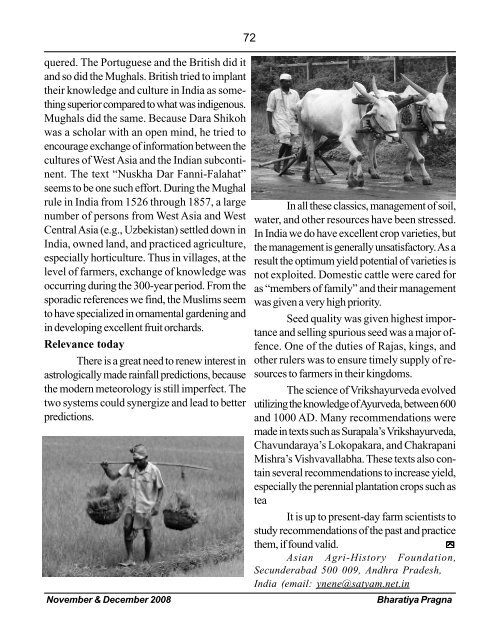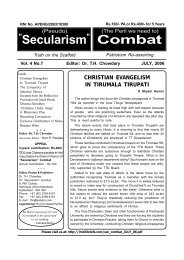Bharatiya Pragna - Dr. Th Chowdary
Bharatiya Pragna - Dr. Th Chowdary
Bharatiya Pragna - Dr. Th Chowdary
You also want an ePaper? Increase the reach of your titles
YUMPU automatically turns print PDFs into web optimized ePapers that Google loves.
quered. <strong>Th</strong>e Portuguese and the British did it<br />
and so did the Mughals. British tried to implant<br />
their knowledge and culture in India as something<br />
superior compared to what was indigenous.<br />
Mughals did the same. Because Dara Shikoh<br />
was a scholar with an open mind, he tried to<br />
encourage exchange of information between the<br />
cultures of West Asia and the Indian subcontinent.<br />
<strong>Th</strong>e text “Nuskha Dar Fanni-Falahat”<br />
seems to be one such effort. During the Mughal<br />
rule in India from 1526 through 1857, a large<br />
number of persons from West Asia and West<br />
Central Asia (e.g., Uzbekistan) settled down in<br />
India, owned land, and practiced agriculture,<br />
especially horticulture. <strong>Th</strong>us in villages, at the<br />
level of farmers, exchange of knowledge was<br />
occurring during the 300-year period. From the<br />
sporadic references we find, the Muslims seem<br />
to have specialized in ornamental gardening and<br />
in developing excellent fruit orchards.<br />
Relevance today<br />
<strong>Th</strong>ere is a great need to renew interest in<br />
astrologically made rainfall predictions, because<br />
the modern meteorology is still imperfect. <strong>Th</strong>e<br />
two systems could synergize and lead to better<br />
predictions.<br />
72<br />
In all these classics, management of soil,<br />
water, and other resources have been stressed.<br />
In India we do have excellent crop varieties, but<br />
the management is generally unsatisfactory. As a<br />
result the optimum yield potential of varieties is<br />
not exploited. Domestic cattle were cared for<br />
as “members of family” and their management<br />
was given a very high priority.<br />
Seed quality was given highest importance<br />
and selling spurious seed was a major offence.<br />
One of the duties of Rajas, kings, and<br />
other rulers was to ensure timely supply of resources<br />
to farmers in their kingdoms.<br />
<strong>Th</strong>e science of Vrikshayurveda evolved<br />
utilizing the knowledge of Ayurveda, between 600<br />
and 1000 AD. Many recommendations were<br />
made in texts such as Surapala’s Vrikshayurveda,<br />
Chavundaraya’s Lokopakara, and Chakrapani<br />
Mishra’s Vishvavallabha. <strong>Th</strong>ese texts also contain<br />
several recommendations to increase yield,<br />
especially the perennial plantation crops such as<br />
tea<br />
It is up to present-day farm scientists to<br />
study recommendations of the past and practice<br />
them, if found valid. <br />
<br />
<br />
Asian Agri-History Foundation,<br />
Secunderabad 500 009, Andhra Pradesh,<br />
India (email: ynene@satyam.net.in<br />
November & December 2008 <strong>Bharatiya</strong> <strong>Pragna</strong>



